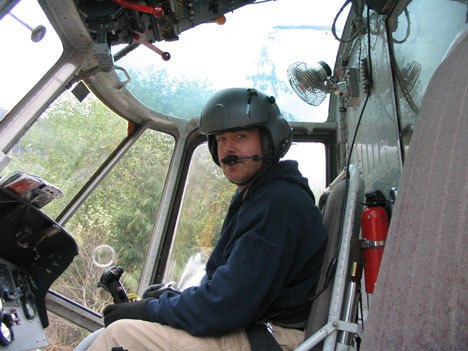FREELAND — Eric Nance is a long way from the chaos in Haiti, but he’s anxious to find a way back.
A helicopter pilot by trade, Nance spent four months in that hard-luck island country dealing with the destruction caused by Hurricane Gustav in August 2008.
Between jobs and visiting with his mother in Freeland, Nance said this week he has volunteered to return to Haiti to help in the aftermath of Tuesday’s catastrophic earthquake.
The 7.0 quake near the capital of Port-au-Prince virtually flattened the city and may have killed as many as 50,000 people, with the death toll continuing to rise, officials said Thursday.
“There are 3 million people in an area the size of Everett and Mukilteo,” Nance said. “I know Port-au-Prince intimately. They’re in a really bad way.”
Nance said he’s calling everyone he knows in the helicopter business to find a way to help. He’s ready to get on a plane as soon as he gets the call from a contractor working with the government.
“But things are pretty chaotic right now,” Nance said. “No one’s sure who’s running things.”
His mother is Sylvia Stinson of Freeland. He’s here as part of a family holiday-visiting tour begun after his latest contract ended about a month ago.
Stinson and her husband Tom are retired educators from California and have been South Whidbey residents for the past six years.
Stinson is supportive of her son’s efforts to return to Haiti.
“It’s a horrible tragedy, and Eric has strong feelings about it,” she said Thursday. “What do mothers do? They worry.”
During Nance’s first helicopter- piloting stint in Haiti, he ferried medical workers, supplies and technicians dealing with the aftermath of the hurricane.
Nance told of one incident then that illustrates the overwhelming task facing the impoverished country today.
A small, highly localized earthquake, about 3.0 on the Richter scale, caused a school to collapse about 15 miles east of the city. There followed a short period of rain, but nothing like the downpour this past week.
When the school imploded, more than 100 students were killed, and another 100 were injured.
“It took them six hours to get a front-end loader up to the school,” Stinson said. “That was just one building — and that’s when the roads were good.”
He said there are only three main thoroughfares through Port-au-Prince, now probably clogged with refugees. All the side streets, he said, are certain to be covered with debris from fallen walls and buildings.
“They would be basically impassable now,” he said of the city’s roads. “The people are running out of food, water and medical supplies. Hygiene’s going to be a big issue. The only way now is by helicopter.”
Stinson, 37, who lives in northern California, spent a tour of duty in the Air Force as a helicopter mechanic. When he left the service, he used his veteran’s benefits to become a helicopter pilot.
“It was a childhood dream,” he said.
Since then, he has worked for private contractors at various flying jobs in several parts of the world. Most recently, he helped to battle wildfires in California.
Nance said that because it’s winter, dozens of civilian helicopters and crews trained for the kind of pinpoint work required in Haiti are sitting idle in several parts of the U.S.
“It’s a matter of funding,” he said. “That’s the only thing holding it up.”
Meanwhile, he said he has tried to keep in touch with Haitians he knows in Port-au-Prince. He finally heard from one woman friend who had been missing since the earthquake.
“She got in contact through Facebook,” Nance said. “They’re living in a parking lot now.”
“There are lots of folks I’m concerned about, and am waiting to hear if they’re OK,” he added. “Time will tell.”
Nance urges everyone to contribute what they can to the aid effort. He especially commended the work of Doctors Without Borders, whose members he has helped to transport in the past.
“They’re the most talented, bright, dedicated human beings I’ve ever seen,” Nance said. “They put themselves in the middle of harm’s way anywhere in the world.”
For donation information, visit www.doctorswithoutborders.org.
Nance described the Haitians themselves as dedicated, hard-working individuals struggling against monumental odds even in the best of times.
“They’re either dirt-poor or filthy-rich,” he said, “and 90 percent of them are in the first category.”
“It’s unfortunate,” he continued. “These people demanded freedom 200 years ago, and a great part of western civilization has turned its back on them.”
“They have the potential to do great things,” he said, “but our attitude toward them has to change.”



